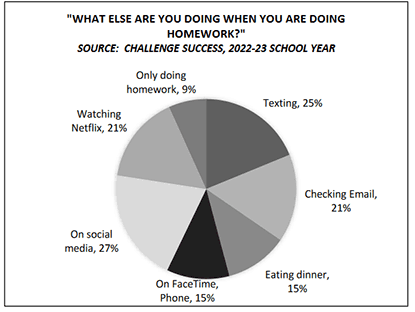The Healthy Homework Act was introduced in an effort to ensure school districts create policies that are more intentional when it comes to homework.
According to the bill’s author, Assemblywoman Pilar Schiavo, with local control and input from teachers, students, and parents, AB 2999 aims to create supportive, equitable homework policies for our kids’ mental and physical health.
The bill was inspired by her Schiavo daughter Sofia which she officially announce the The Healthy Homework Act during a press conference on April 24, 2024.
“Let’s make homework more supportive and less stressful,” said Schiavo.

“Students have chosen ‘overall workload and homework’ as a top stressor. With the mental health crisis in schools only getting bigger, we need to do something to help give out pupils some breathing room. Studies suggests that all students need play time, down time, and family time in order to have a healthy mind and a healthy body. However, current homework practices are inconsistent, wide ranging, and can lead to hours of homework per night for already strained student schedules. One in five teens cannot regularly complete their homework due to a lack of internet access. The problem is even greater in lower income areas. Some students who act as caregivers, who work to help with family finances, or who experience housing insecurity face unique challenges in completing homework. Giving students less homework or not grading it can give pupils that support and opportunity to unwind after school. AB 2999 seeks to begin the conversation at the local level to develop homework policies based on what research is saying is equitable and beneficial to the academic success of students,” said Schiavo (source + 9 page document on the bill)

According to the bill’s author, survey data from Challenge Success, based on 15,000 high school students in California found:
- More than half of the students reported that the longest time they had spent on homework in the past week was 3 or more hours
- Students were roughly split between reporting that they had the right amount of homework (51%) and too much homework (47%).
- Nearly all students reported doing something else while doing homework, with over half reporting that they were either texting (25%) or using social media (27%)
- 45% of students reported that overall workload and homework is a major source of stress in their lives.
- Nearly two-thirds of students (64%) said that in some or many of their classes the assigned homework helped them learn the material. A little over half (52%) reported that some or many of their classes assigned busywork for homework.
According to the Healthy Homework Act:
- Requires each local educational agency (LEA) to develop, adopt, and update at least once every five years, a homework policy to create guidelines for clearer practices on assigning homework in transitional kindergarten (TK) through 12th grade. Specifically,
- Requires the governing boards of LEAs, in developing the homework policy, to:
- Consider recent research on homework’s impact on each of the following:
- Student mental health;
- Student physical health;
- Equity in education; and
- Appropriate uses of homework at each grade level that allow for experimentation or preparation, along with being beneficial to students, and that enhance the educational program.
- b) Consider all of the following
- The meaningful input with shared leadership of teachers, educators, administrators,
parents, school counselors and social workers, and students; - The reasonable amount of time spent on homework per student that should not be
exceeded; - The lack of universal access to the internet, computers, and learning tools;
- Language barriers;
- Students with learning disabilities;
- The significant investment of staff time on homework;
- Using homework strategically when it is most impactful;
- Whether homework should be assigned or required in transitional kindergarten, kindergarten, or in any elementary school grade, inclusive, with appropriate exceptions;
- Whether homework should be optional and not graded; and
- Appropriate accommodations, if needed, to address the mental health impacts of homework.
- The meaningful input with shared leadership of teachers, educators, administrators,
- Consider recent research on homework’s impact on each of the following:
- Requires the homework policy to be publicly discussed, with public comment, and considered for adoption at a minimum of two separate regularly scheduled public meetings.
- Requires LEAs to annually distribute the adopted homework policy at the beginning of the school year to all certificated staff and administrators, to all students and parents or legal guardians as part of the annual parent notification or upon enrollment, and by publication on the LEA’s website and on the websites of the individual schools.
- Encourages each private school to adopt a homework policy with guidelines consistent with this measure.
- Defines LEA, for purposes of the measure, to mean a school district, county office of education (COE), or charter school.
- Makes findings and declarations about the harms of homework.
More on the Healthy Homework Act:
LEGISLATIVE COUNSEL’S DIGEST
Other recent school stories:
April 19 – Contra Costa County Teacher of the Year Finalists Announced


1 comment
Ah, more micromanaging by the almighty State. According to Schiavo’s statement, her “Healthy Homework Act” means “giving students less homework or not grading it .” In plainspeak, more dumbing down of academic requirements even though American schools are far behind those of many other countries. The idiocy of this state’s legislators never fails to amaze.